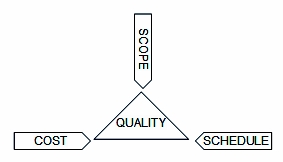1. What is a project?(项目的定义)
A project is ‘an undertaking that has a beginning and an end and is carried out to meet established goals within cost, schedule and quality objectives’.
Resources are the money, facilities, supplies, services and people allocated to the project.
In general, the work which organisations undertake involves either operations or projects.
2. The Nature of Project Management (项目管理的特性)
Compared with the management of day-to-day operations, project management has the following additional challenges:
·Project teams usually include people from different departments, with different working cultures, who have to work together on the project objectives.
·The work of a project is usually performed once only, unlike operations in which the same tasks may be performed regularly. The project team will, therefore, be dealing with new challenges for the first time.
·The objectives of a project need to be specified, otherwise there may be "scope creep".
·Projects usually have a deadline and a budget.
3. Project Challenges for Management(管理项目的方式)
Project Management Triangle
Each project has key attributes of scope, schedule and cost. These attributes have been coined "the iron triangle" or "triple constraint" because changing any of these will change the effectiveness (i.e. "quality") of the project deliverable.

·Scope—What the project was designed to achieve, either through a business case or through a less formal process. Although usually determined at the beginning of the project, scope may change over time (i.e. "scope creep").
·Schedule
·Cost
The triple constraint illustrates opportunity costs if quality is to be maintained:
·Increasing the scope will require more time, increased cost or both;
·Squeezing the schedule will require narrowing the scope, increasing the cost or both; and
·Decreasing the cost will require narrowing the scope, increasing the time, or both.
Project managers retain responsibility for communicating project management constraints at the outset, monitoring progress as the project matures and communicating variance from plan to the appropriate responsible person:
·Stakeholders often lobby for greater project scope without full awareness of the costs and time that may be required;
·Financial managers or those with budget authority will often lobby for lower costs without being aware of the effects on quality; and
·Department heads that grant resources to the project will frequently lobby for less staff time spent on the project and away from their regular jobs.

精品好课免费试听
